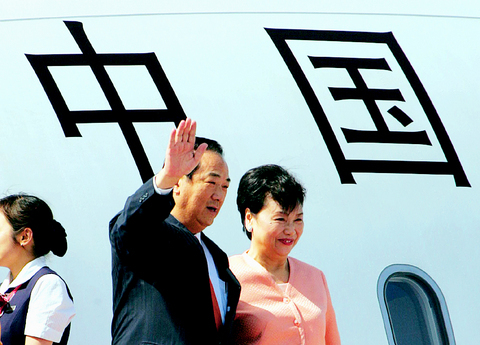Speaking in Xian on the first day of his trip to China, People First Party (PFP) Chairman James Soong (宋楚瑜) said that he was moved to finally be able to set foot on the other side of the Taiwan Strait.
"Everyone knows that the Strait between the two shores is only 100-odd kilometers wide, but it is moving for myself and [Chen] Wan-shui [陳萬水, Soong's wife] that it took us more than 50 years to cross the very narrow divide that is the Taiwan Strait," Soong said after arriving in Xian yesterday afternoon.
He was greeted at the airport by Beijing's Taiwan Affairs Office director Chen Yunlin (

PHOTO: AP
Speaking at Xian's airport upon arrival, Soong talked of his hopes for the trip and emphasized the "similar interests" shared by citizens of China and Taiwan as "common descendants of Yan Di."
Legend says that Yan Di was the father of Chinese agriculture and one of the first ancestors of the "Chinese people."
"I chose Xian as our first stop in China for two reasons. First, to look for the origin of our bloodline, and second, to build a bridge to the future," Soong said.
All Taiwanese, whether they are Hakka, Mainlander or Hoklo, trace their bloodlines to China, and thus were all Chinese people, he said.
In a play on words, Soong said that he hoped his journey would establish a "fourth direct link" -- a connection between the spirits of all "descendants of Yan Di."
"Many supporters asked me whether or not I would be able to facilitate the establishment of the `three direct links.' I've told them it is more important that I establish the `fourth link,' the link between the spirits on both sides of the Taiwan Strait," Soong said.
After visiting the Huangdi Mausoleum today, Soong is scheduled to fly to Nanjing.

NATIONAL SECURITY THREAT: An official said that Guan Guan’s comments had gone beyond the threshold of free speech, as she advocated for the destruction of the ROC China-born media influencer Guan Guan’s (關關) residency permit has been revoked for repeatedly posting pro-China content that threatens national security, the National Immigration Agency said yesterday. Guan Guan has said many controversial things in her videos posted to Douyin (抖音), including “the red flag will soon be painted all over Taiwan” and “Taiwan is an inseparable part of China,” while expressing hope for expedited “reunification.” The agency received multiple reports alleging that Guan Guan had advocated for armed reunification last year. After investigating, the agency last month issued a notice requiring her to appear and account for her actions. Guan Guan appeared as required,

A strong cold air mass is expected to arrive tonight, bringing a change in weather and a drop in temperature, the Central Weather Administration (CWA) said. The coldest time would be early on Thursday morning, with temperatures in some areas dipping as low as 8°C, it said. Daytime highs yesterday were 22°C to 24°C in northern and eastern Taiwan, and about 25°C to 28°C in the central and southern regions, it said. However, nighttime lows would dip to about 15°C to 16°C in central and northern Taiwan as well as the northeast, and 17°C to 19°C elsewhere, it said. Tropical Storm Nokaen, currently

‘NATO-PLUS’: ‘Our strategic partners in the Indo-Pacific are facing increasing aggression by the Chinese Communist Party,’ US Representative Rob Wittman said The US House of Representatives on Monday released its version of the Consolidated Appropriations Act, which includes US$1.15 billion to support security cooperation with Taiwan. The omnibus act, covering US$1.2 trillion of spending, allocates US$1 billion for the Taiwan Security Cooperation Initiative, as well as US$150 million for the replacement of defense articles and reimbursement of defense services provided to Taiwan. The fund allocations were based on the US National Defense Authorization Act for fiscal 2026 that was passed by the US Congress last month and authorized up to US$1 billion to the US Defense Security Cooperation Agency in support of the

PAPERS, PLEASE: The gang exploited the high value of the passports, selling them at inflated prices to Chinese buyers, who would treat them as ‘invisibility cloaks’ The Yilan District Court has handed four members of a syndicate prison terms ranging from one year and two months to two years and two months for their involvement in a scheme to purchase Taiwanese passports and resell them abroad at a massive markup. A Chinese human smuggling syndicate purchased Taiwanese passports through local criminal networks, exploiting the passports’ visa-free travel privileges to turn a profit of more than 20 times the original price, the court said. Such criminal organizations enable people to impersonate Taiwanese when entering and exiting Taiwan and other countries, undermining social order and the credibility of the nation’s